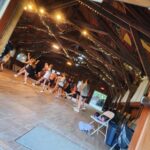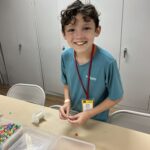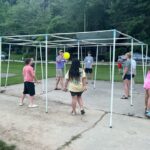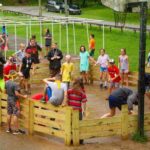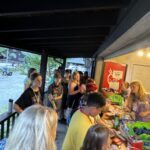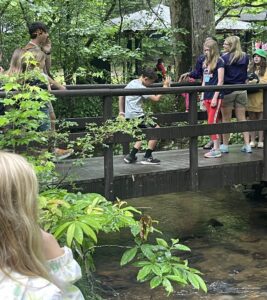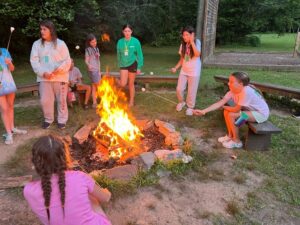Cloverleaf Camp
Cloverleaf camp is a great all around fun camp experience. Children attend camp with their county 4-H club and county 4-H adult leaders. Normally children have completed 5th or 6th grade, but counties are permitted to bring children at least 9 years and up. Contact your county extension office for more information how to join this camp.
PARENT & YOUTH INFORMATION FOR CLOVERLEAF SUMMER CAMP
Activities at Wahsega Cloverleaf Camp
GENERAL CAMP PROGRAM ACTIVITIES
NIGHT RECREATION – Many activities are available during Night Rec including:
- Rec Hall – Dances and fun games are a 4-H tradition. The party is in the Rec Hall led by camp counselors.
- Arts & Crafts – Craft activities led by a counselor will be available in the classroom
- Outdoor sports – Basketballs, volleyballs, Frisbees and footballs are Counselors will be there playing with kids
- Ga Ga ball – Kids love this camp game which is a safer form of dodge ball
- Camp Hair – Camp Hair is an activity for campers who wish to get fun decorations in their hair
- Canteen Time–Bring some spending money for goodies during evening canteen time.
LINE DANCING – No standing against the wall! Using popular songs and old favorites, counselors teach a variety of line dances to campers during both Night and Day Recreation times.
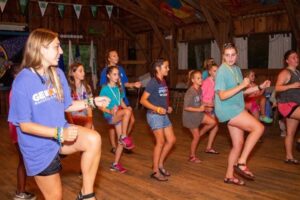
TALENT SHOW – Hey! If you have talent, show off your talents at the Talent Show. Dancers, singers, actors, piano players or campers with any other talents are encouraged to sign up. Your child may want to pack things to use for the talent show, such as special outfits, an instrument, props, etc.
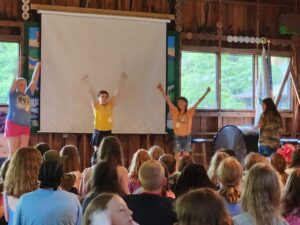
MORNING BREAKFAST CHEERS – Who gets breakfast first??? The winners of the breakfast cheer!!!
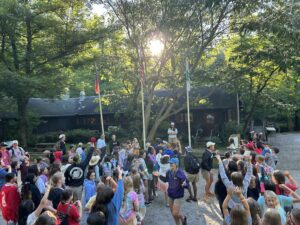
MONDAY NIGHT CAMPFIRE – On Monday night the campers will have a chance to attend a campfire with their Family Group and make S’mores.
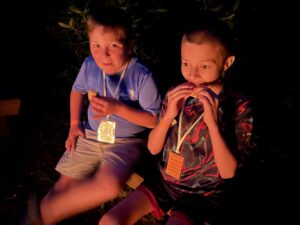
SWIMMING & WATERFALLS – During swim times at Wahsega, campers can swim in the pond or slide down the waterfalls.
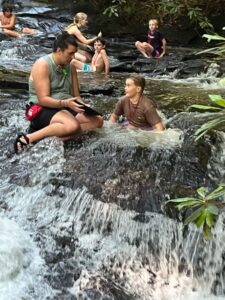
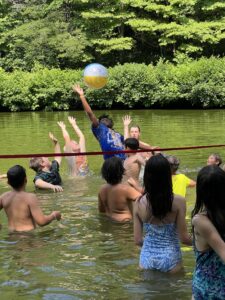
WATER GAMES – A hot afternoon, 150 kids, a bunch of crazy games and lots of fun and water.
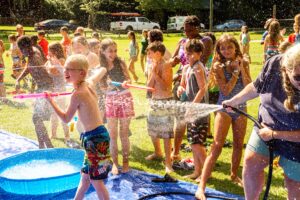
4-H ASSEMBLIES – What’s 4-H all about? Recognition of active 4-H’ers and skits gives campers a look at what else 4-H has to offer.
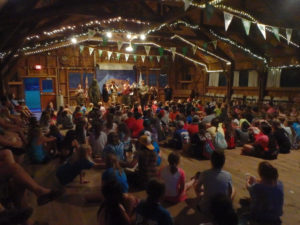
WEDNESDAY HAMBURGER COOKOUT – Burgers on the grill is Wednesday evening’s meal! Served up by the adult leaders in your family group.
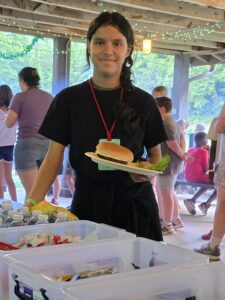
THURSDAY NIGHT CAMPFIRE – The big finale for the week! A fun evening of counselor skits, stories and stunts that everyone will enjoy.
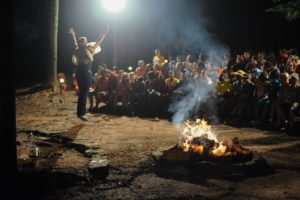
ANIMAL GROUP ROTATIONS
All campers have the opportunity to take all classes offered. Note that this is a representative list of classes. The final list has not been determined.
ARCHERY – An introduction to archery. Learn about the gear, shooting techniques and following com- petition-style commands. Campers have many opportunities to shoot bows and arrows during the class.
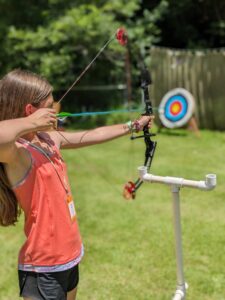
STREAM ECOLOGY – Campers learn about the wildlife habitat in the creek at Wahsega and have the opportunity to catch small critters with dip nets.
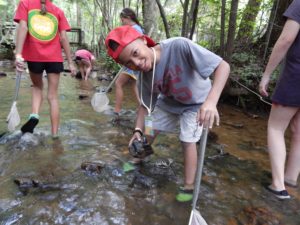
HERPETOLOGY – Herpetology is the study of reptiles and amphibians. In this class, campers may touch and hold non-venomous snakes in our Herp Lab and turtles at our outdoor habitat called Turtletopia.
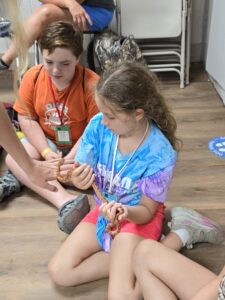
WILDERNESS SURVIVAL – What do you do if you are in a situation where you are lost in the woods with no water, food or shelter and the sun is going down? First: Don’t panic.
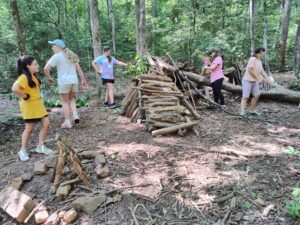
FOREST ECOLOGY – A lot more than just trees. Take a hike over the mountain and look at animal and plant life, soil, geology, water and the importance of maintaining healthy ecosystems.
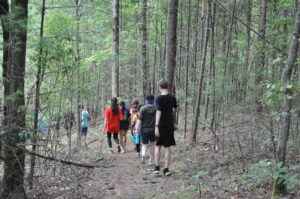
FAMILY GROUP ROTATIONS
High-ropes Challenge Course & Tubing. All campers will do all activities.
CLIMBING WALL – Wearing a harness attached to a rope and belay system, campers face the daunting challenge of climbing a 35-foot wooden wall with nothing to hold on to but tiny, rocky handholds.
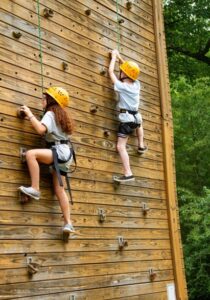
ZIP-LINE – Climb the pole. Jump. Zip! It’s easy. Campers wearing a harness attached to a belay system are transferred to the Zip-line by a counselor stationed on a platform at the top of the pole.
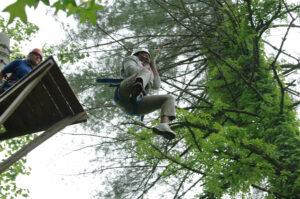
FLYING SQUIRREL – The camper is the squirrel. Hooked to a rope at their back, campers are lofted 45 feet in the air by a team of other campers pulling the rope. Counselors check safety harnesses and pro- vide direction to the squirrel and belay team.
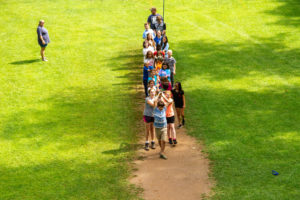
TUBING– Campers are bused to Appalachian Outfitters in Dahlonega where they tube down the Chestatee River.
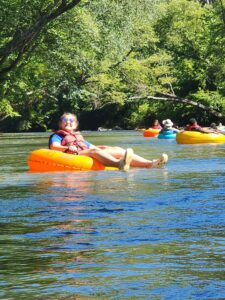
ORGANIZED RECREATION – While some campers are participating in the high-ropes challenges, others will be waiting. Instead of just sitting there, they will have the opportunity to participate in indoor and outdoor recreation activities led by one of our summer camp counselors.
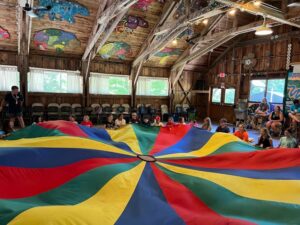
Cloverleaf Camp Schedule Summary
CLOVERLEAF CAMP SCHEDULE
MONDAY
1:00-3:00 Arrival & Check-in
Family group meeting, swim test, pond and falls time swimming time, night recreation (arts & crafts, sports, play in creek, games with counselors, canteen open), family group campfire
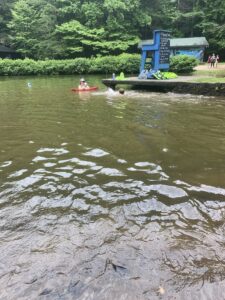
TUESDAY
Family group meeting, family group rotations (high ropes, day recreation), pond and falls swimming time, animal group rotations, bear hunt, night recreation. Animal group rotations include various Wahsega environmental education classes: archery, herpetology, survival, stream ecology and forest ecology.
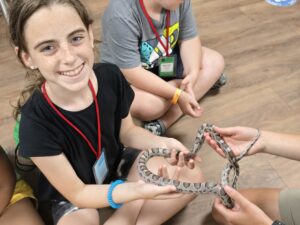
WEDNESDAY
Family group meeting, family group rotations, pond and falls swimming time, animal group rotations, night recreation, family group hamburger cookout, talent show
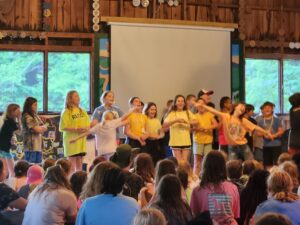
THURSDAY
Family group meeting, family group rotations, pond and falls swimming time, animal group
rotations, all camp water games, campfire program, slideshow
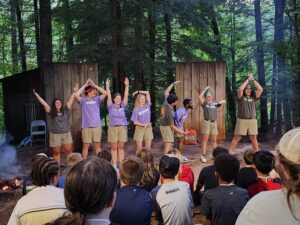
FRIDAY
Camp cleanup activities, load up luggage, closing assembly awarding the pot of gold. Depart about 9:30am.
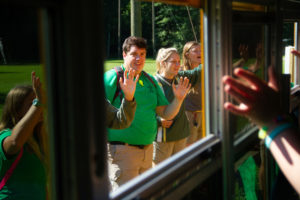
What to Pack
WHAT TO PACK FOR CAMP
CLOTHING & GEAR
- Shirts
- Shorts
- Underwear
- Socks
- Extra socks
- Swimsuit or swim trunks
- Jacket or sweatshirt (for cool mornings and nights)
- Rain jacket
- Sunglasses
- Hat
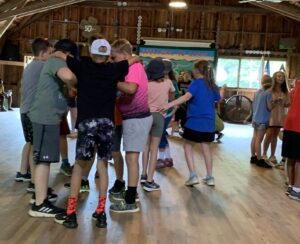
FOOTWEAR
- Sandals (sturdy sandals or crocs with a heel strap) or old tennis shoes that can get wet
- Tennis shoes or other comfortable shoes to keep dry and run around in
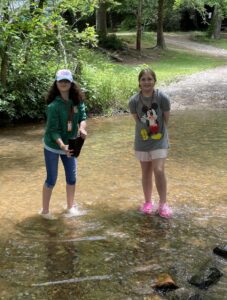
LINENS
- Sleeping bag (an inexpensive sleeping bag will work fine) or sheets & light blanket. Our beds are twinXL.
- Pillow and pillow case (pillows are not provided)
- Towels (for showering and after swimming)
- Wash cloth and hand towels
- Laundry bag or trash bag for wet Be sure to label trash bags well
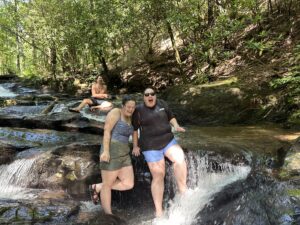
TOILETRIES
- Shower caddy, basket, bag or toiletries kit to carry supplies to and from the bathhouse
- Soap and soap container
- Shampoo
- Toothbrush with protective holder
- Toothpaste
- Deodorant
- Brush, comb and hair accessories
- Shaving supplies
- Feminine supplies
- Sunscreen
- Insect repellent
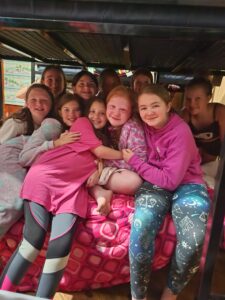
HOW MEDICATIONS ARE HANDLED
Plan to turn in meds to your child’s 4-H leader before departure from the county on Monday morning.
- Prescription medications in their correct and unexpired bottles or packages
- Over-the-counter medications in correct and unexpired bottles or packages
- A zip-lock bag labeled with the camper’s name for their prescription and over the counter medication
- 4-H Medicine Form is required for all medicines.
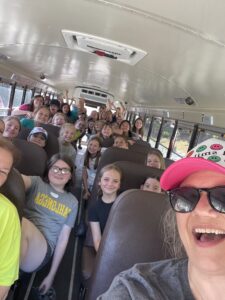
OPTIONAL ITEMS
- Wallet or purse
- Money for the Canteen (crisp $1 and $5 bills for drink machines)
- Talent Show supplies to showcase your talent.
- Writing paper, stamps and envelopes (these items are not sold at Wahsega)
- Flashlights
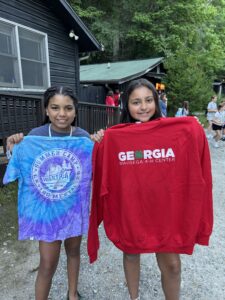
PACKING TIPS
LABEL EVERYTHING
- Mark all clothing, shoes, luggage and other items with the camper’s
- Label trash bags used for dirty clothes because they can be confused with trash.

HELPFUL HINTS
- Pack a daily change of clothing at the at the minimum. Extra outfits may be helpful.
- Shorts and T-shirts are Sleeveless shirts and tank tops are allowed (but see the Dress Code).
- Pack older clothes that can get wet or muddy, not nice new clothes.
- Pack a few plastic bags for dirty clothes and shoes.
- Pack shorts that extend at least to mid-thigh for the high-ropes.
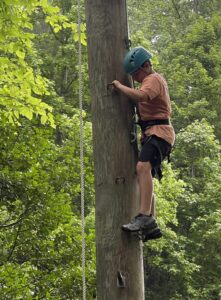
ABOUT WET CLOTHES
- Clothes will get wet, so pack extra socks and underwear – more than you would normally.
- Blisters are a common occurance when wearing wet shoes and socks. Encourage campers to wear dry socks and shoes to prevent blisters.
- Wearing wet shorts and underwear will cause a painful rashes. Educate your child about this.

ABOUT SHOES
- Pack at least two pairs of shoes, one to keep dry, one to get wet.
- Comfortable shoes or sandals are a must. Don’t take new shoes or sandals to camp.
- Closed-toe shoes are required for the high-ropes.
- Comfortable sandals with heel straps or crocs are okay if the heel strap is worn on the heel.
- Pack shoes to keep dry (tennis shoes for running around, hiking, climbing, and other times).
- Pack shoes that can get wet ( water shoes, or sturdy sandals with a heel strap)
- Flip flops and slides are not allowed except for showering.
- Footwear (not flip flops) is required when wading in the creek or playing in the waterfall.
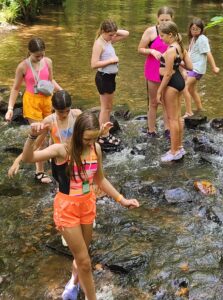
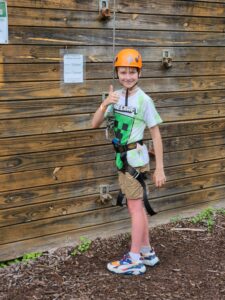
DRESS CODE
Dress modestly. Campers wearing clothes deemed inappropriate by chaperones will be asked to change. Here are some guidelines:
- Revealing shorts, pants, and sleep pants or boxer shorts worn on the outside are not
- Underwear must be worn and must not be visible. Briefs, boxers and bras are underwear.
- Sagging is not allowed.
- Clothing with advertising that encourages breaking the 4-H Code of Conduct is not allowed.
- Halter tops, backless shirts, ripped T-shirts, one-shoulder tops, spaghetti straps, visible midriffs and other shirts or tops that are not modest won’t be allowed.
- When swimming, girls should wear a one piece or a tankin A bikini is not acceptable at camp.
- Girls may choose to wear a dark colored T-shirt cover-up, swim trunks or modest cut-offs.
- Boys swimsuits should be shorts, swim trunks, board shorts or cut-offs; not boxers or swim briefs.
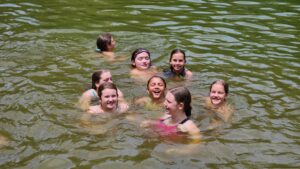
WHAT NOT TO PACK
- No knives, firearms, fireworks or any other dangerous These items will be confiscated.
- No valuable jewelry, large amounts of money, expensive phones or We are not responsible for lost or stolen items.
- No personal food and snacks unless prearranged for dietary needs (no snacks in the cabins)
- No prescription medications kept with a Meds must be turned in to the 4-H leaders.
- No alcohol, tobacco, matches, lighters or anything else that breaks the Georgia 4-H Code of Conduct.
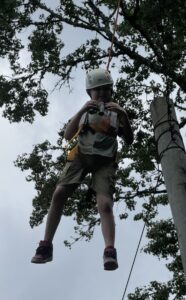
CELL PHONE POLICY
Cloverleaf level (4th-6th Grade) 4-H’ers are strongly discouraged from bringing cell phones and other electronic devices to 4-H events and camp. If brought, cell phones and other devices must be left in the cabin during scheduled activities and put away at lights out. Cell phones may be confiscated and returned at the end of the event if their possession or use is determined to be disruptive to camp or event activities. Your county 4-H leader may advise you of further cell phone guidelines. Please note most mobiles phones do not have reception at Wahsega and there is no WiFi access for campers.
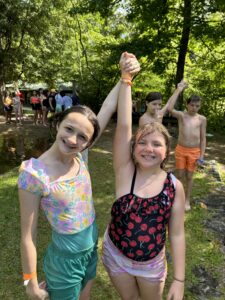
LOST AND FOUND
We will attempt to return items while your child is still at camp. Remind your child to be responsible for their own property. Please label all items with a permanent marker for easy identification. While at camp lost and found items are placed on the crosstie wall around the basketball court or in a bin i the rec hall. Call immediately if you discover that your child’s belongings are missing. The more time that passes, the less likely it will be found. We are not responsible for property that is lost, stolen, damaged or left behind.
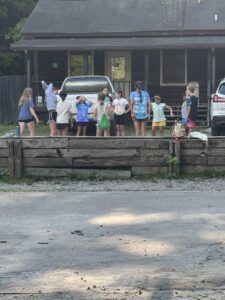
OPTIONAL SUPPLIES FOR CHAPERONES
Some adults are comfortable traveling light and others aren’t. Experienced chaperones can anticipate camp but people new to this may not, so here is a big list of some of the items that adult leaders may want to include in their luggage.
- Folding lawn chair
- Bug spray
- Sunscreen
- Air freshener
- Small cooler (we have ice available in the Dining Hall)
- Hats
- Sunglasses
- Book to read
- Flip flops for the shower
- Alarm clock
- Electronic device cords and wall adapter (for computer, iPod, iPad, Kindle, cell phone, )
- Batteries
- Flashlight
- Personal fan
- Extension cord
- Clip on book reading light
- Small folding TV tray table to serve as a bedside table
- Writing pen or Sharpie
- Variety of shoes and sandals
- Extra towels
- Soft drinks (only caffeine-free drinks are sold in the vending machine at Wahsega, the canteen offers caffeinated Coke and Diet Coke)
- Snacks (not allowed in cabin, they will attract mice and ants, but can be kept in Pavilion 4)
- Beach towels
- Cash or checks for souvenirs, snacks and (We aren’t set up to take credit cards.)
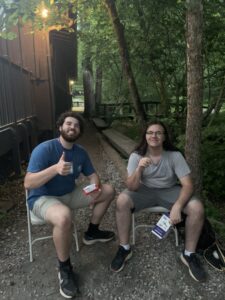
Rules at Summer Camp
CAMP RULES
Each camper signs the 4-H Code of Conduct. Campers should understand the rules. Failure to adhere to the rules will result in disciplinary action.These rules are worded positively. We believe positive statements help us advance a vision for what we want to happen.
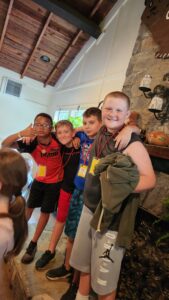
We expect campers to show a great deal of responsibility for themselves, their behavior and their property. Both emotional and physical aggression is cause for discipline. Campers may not exert force against anyone or harm or threaten them nor may they take or damage anyone’s property including the 4-H center’s property.
- Respect everyone – their body, their space, their property and their emotions
- Be respectful to all adult leaders and counselors—they are in charge to keep you safe and unsure everyone has a fun time—do what they say
- If you are having a problem with another camper tell an adult leader—they are here to help you
- Respect other living creatures including plants, snakes and other wildlife
- You may pick up rocks and look at them, then place them back on the ground
- Wear shoes or sandals at all times except when swimming in the pond or showering
- Wear shoes or sandals while wading in the creek or playing in the waterfalls
- Sleep on pillows rather than fight with them
- Store and eat food outside of the cabin. Food inside the cabin attracts ants and mice.
- Be waiting at the Dining Hall when the KP bell rings if it’s your turn to be on KP
- When the bell rings, hurry to where you are expected to be
- Leave chewing gum at home
- Only go into your own cabin rather than other people’s cabins
- Keep your money with you rather than leaving it in your cabin
- Throw all trash in trashcans and cans and bottles into recycling
- Dress modestly
- Leave electronic devices at home or in your cabin
- Coffee served in the dining hall is for adults only
- Phones are only for adult use
DISCIPLINING MISBEHAVIOR AT CAMP
Georgia 4-H policy states that no corporal or physical punishment is allowed. We will correct minor misbehavior by having a child take an immediate time out. Continued misbehavior may result in the camper being assigned additional cleaning duties.
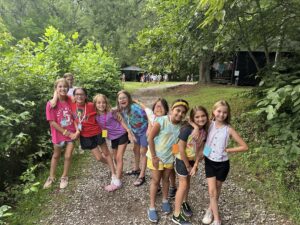
CALLS ABOUT MISBEHAVIOR
It is rare to send a child home from camp for misbehavior, but it does happen. We will work with you to help your child be a successful camper. Behavioral reasons causing dismisal from camp include but are not limited to:
- Refusal to comply with the Georgia 4-H Code of Conduct
- Behavior that endangers other campers or staff
- A persistent pattern of recurring misbehavior
- Physical, verbal or psychological bullying
- Instigating social drama and interpersonal conflict
- Sexually explicit or suggestive language or behavior
There are times, due to violating the Georgia 4-H code of conduct, that we have to call law enforcement. If this happens we will also call you and keep you fully informed of what is happening. This is Georgia 4-H Policy. Examples of some misbehaviors that trigger calling law enforcement are hitting or seriously threatening another camper or inappropriate sexual behavior. Our goal is always to make Georgia 4-H events, including summer camp, a very safe place for all children to be at.
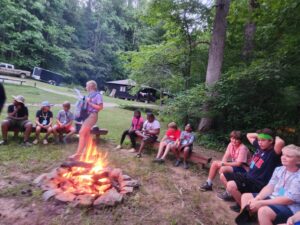
DAMAGE TO THE FACILITY
Occasionally, children cause minor unintentional damage for which you are responsible even though the damage was an accident. We will work with you to address incidents that result in damage fees whether they are intentional or unintentional.
What to Expect at Camp Wasega
It’s natural to be anxious about leaving home, adopting new routines, and meeting new friends. To minimize anxiety, here is some information to help you and your child know what to expect.
EXPECT OLD FASHIONED SUMMER CAMP CABINS
Wahsega’s cabins were built in the 1930’s by the CCC and provide a true camp experience. Most of our cabins are a single large room of twin xl bunk beds. Everyone sleeps in bunk beds and each camper has their own bed. One or two adult leaders also sleep in the cabin, so there is always good supervision to keep kids safe. Campers compete for the “Clean Cabin Clover” award each day by cleaning up the cabin in the morning.
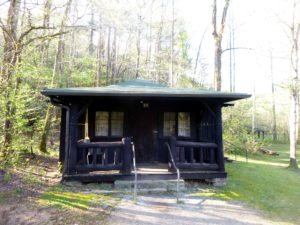
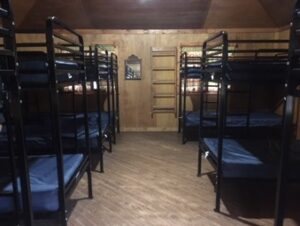
EXPECT BATHHOUSES
There are separate girls’ and boys’ bathhouses with separate individual shower and toilet stalls. Campers carry their toiletries, towels and change of clothes to the bathhouse during their scheduled shower time. Campers should be sure to take all their belongings with them when they leave the bathhouse. A cabin group is assigned to clean the bathhouse each day.
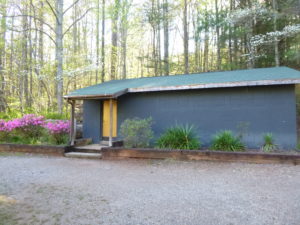
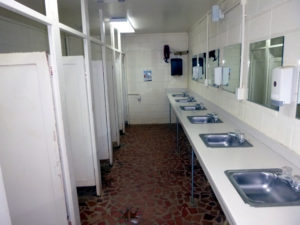
EXPECT GREAT FOOD
Wahsega serves three meals per day cafeteria style. There will only be one main entry and about two sides and a drink. We design our menu carefully to serve food that children will enjoy eating. Let your child know that even if they don’t like the food served it’s important to eat it because they will be active all day and there are no other snacks served. At times the canteen will be open which does sell snacks like chips, candy or freeze pops. A sample menu is posted on our Dining Services page.

EXPECT SPECIAL SERVICE FOR SPECIAL DIETS
If your child is allergic to any foods or requires a special diet, arrangements can be made but please let the county 4-H leader know immediately so we can communicate your child’s needs to the camp dining hall manager. We can accommodate almost any special diet we just need to know about it. If it is a particularly challenging combination of allergies, you can call Wahsega 4-H center dining hall (706-864-2905) and speak with the dining hall manager. Do this about one month in advance so there is time for us to plan.
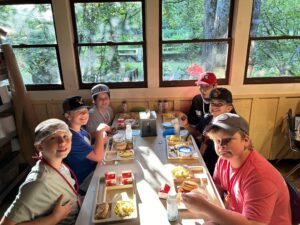
EXPECT SOME CLEANING AND HOUSEKEEPING
Campers are expected to clean the cabin each morning, including making their beds, putting away clothing and sweeping the cabin. 4-H’ers will take turns cleaning the bathhouse. They will also participate in KP duty with other campers at least once during the week. While on KP, campers put down stacked chairs before meals, wipe tables, stack chairs at meal’s end and sweep the dining hall floor.
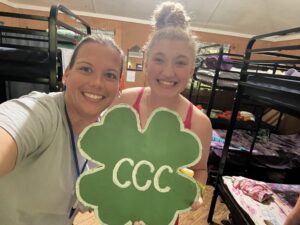
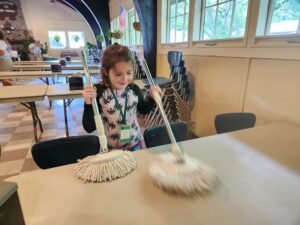
EXPECT CAMPERS TO HYDRATE
Please stress the importance of drinking water to campers. The weather will be hot and we will be out- side all day. Headaches, stomach aches and lack of energy are typically a sign of dehydration. It’s great to pack a water bottle (with name on it). We have drinking fountains and water coolers all around camp to keep kids hydrated.
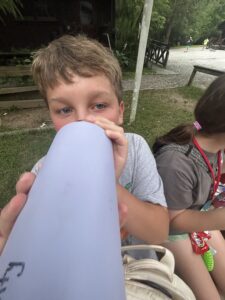
EXPECT CANTEEN TIME THROUGH OUT THE WEEK
The Canteen at Wahsega sells souviners, t-shirts, hats, candy, chips and sodas. Plan on bringing spending money for snacks and souviners. Often parents seperate money into daily allowance envelopes that are given to their campers daily by an adult with the group.
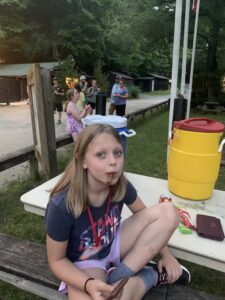
Expect to talk to a staff member if you need to call the 4-H center
A camper’s personal growth at camp is made possible by the time of extended independence that camp provides. To facilitate this growth, phone calls for campers are limited to a family emergency. Even then, expect to speak to a staff member first to coordinate follow-up phone calls with your county 4-H leader to arrange a phone call with your child.
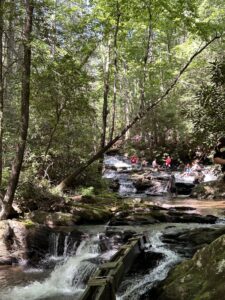
Expect to leave a voicemail when calling after hours
While the office phone is consistently covered during office hours, no one monitors the phone overnight. Please do leave a voicemail and we will call back ASAP.
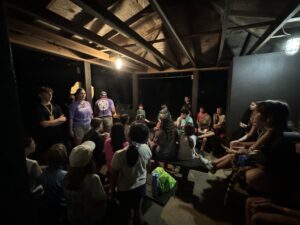
Expect county leaders to call you if there is a need
An adult leader will call you if there are any concerns during camp such as:
- Luggage or personal items that are missing, lost, potentially stolen or left behind (parents have been known to drive off with sleeping bags still in the car!)
- An emergency or injury that results in a visit to the doctor or emergency room
- Serious illness that could result in a visit to a doctor
- Severe cases of homesickness that result in physical illness or an uncooperative camper
Expect campers to smell springtime fresh on Friday morning
Well, probably not! Please tell your child that he should shower a few times during the week of camp. Swimming in the pond or playing in the waterfalls does not count as a bath.
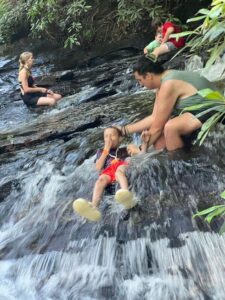
Expect campers to be overjoyed to be back home… when camp is over!
Be very intentional about the topic of missing home. Children will miss home some. That’s normal. However, to help your child handle feelings of missing home in a mature fashion, make positive comments about the great experience they will have at camp. Your comments greatly influence your child’s attitude.
Encouraging Your Child to be a Happy Camper
Campers work through their feelings while at camp
Setting an expectation in your home well before camp starts that your child will be a “happy camper” is the first step in preventing your child from being overwhelmed by missing home.
By pushing through feelings of missing home, campers learn a life skill and become more mature, confident and independent. They don’t have to do that all alone: The county 4-H leaders, chaperones and Wahsega’ s Summer Camp Counselors are trained to handle these situations in constructive and loving ways. Counselors work to help campers overcome being overwhelmed by missing home by encouraging them to accept the feeling of missing family, friends and pets while continuing to make the most of being at camp.
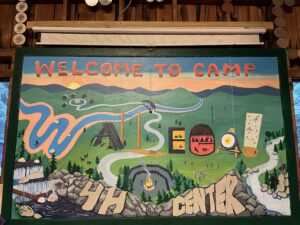
STRATEGIES TO HELP YOUR CHILD WORK THROUGH HOMESICKNESS
- Reach an agreement with your child ahead of time to honor Wahsega’ s no-phone-call policy.
- Don’t bribe. Linking a successful stay at camp to a material object sends the wrong message.
- Pack a personal item from home that promotes positive feelings of
- Be confident about encouraging your child to stay at camp. For many children, camp is a first step toward independence and plays an important role in their growth and development.
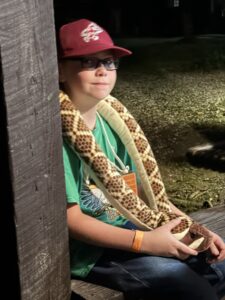
HOMESICK CAMPERS HAVE TO PARTICIPATE IN PLANNED ACTIVITIES
Campers quickly get into the camp routine and don’t have much free time. Campers aren’t allowed to take naps during the day and everyone is expected to be present for activities… even if they are missing home! Homesickness can lead to discipline problems for children who refuse to cooperate because they want to be sent home.
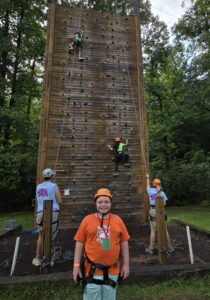
CALLING HOME IS THE LAST RESORT – If a camper is missing home so much that they are miserable, an adult leader will call you. If you agree to allow your child to call home, a time will be set to do so. Allowing the camper to call home usually makes matters worse, so that is not the first thing we’ll do. If you talk to your child, offer calm reassurance and put the short time frame of camp into perspective. Avoid the temptation to agree to come pick up your child early.
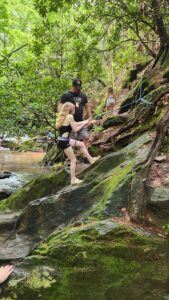
WRITING CAMPERS IS A GREAT IDEA – Campers look forward to hearing from you while at camp. When writing, ask campers about camp and encourage them to be enthusiastic about the experience away from home. Be encouraging and fun. Use positive words in your sentences. Our camp email is the fastest most consistent way to communicate your messages to your camper. Campers will not be able to respond but will love to hear from home.
Steps to Prepare Yourself & Your Child for Camp
What to say about camp months and weeks ahead of time
- Express excitement to your child about the fact that they are going to camp. Worrying aloud about being lonely may set the stage for homesickness.
- Say sincere positive things about summer camp, 4-H and the adults
- Say that you know that events will be fun and safe to make your child feel secure about
- Talk about the positive opportunity to experience
- Tell your child that you look forward to him or her being back home at the end of the week but that you hope they have a good time at
- Discuss expected camp activities in detail, including departure for camp and arrival back at home at the end of the
- Rather than camp being a completely separated experience, talk about the week in the context of your family’s Even though you aren’t together for camp, it is part of what you are doing to give your child a great childhood.
- If you have gone to camp, call it a tradition in your If not, call it a new tradition!
- Encourage children by explaining that missing home is okay but that it shouldn’t stop them from participating in activities and meeting new
- Tell your child that many campers are a little anxious about camp at first and that they have to work at being at camp with a positive
One week before camp
- Be enthusiastic about Again, say positive things about the opportunity to go to camp.
- Label each item your camper will take to camp and work with them to pack appropriate
- Start packing several days ahead of
- Work with your pharmacist to get original containers for Send current and marked bottles of meds. Expired, unmarked or hand-written labels on prescription medication bottles are not allowed.
- Double check the dates, times and location of drop-off and pick-up.
- Make sure you have the forms you need to
The night before
- Make sure your child gets a good night’s sleep at
- Make a final check of your child’s
- Make sure you have your child’s paperwork filled
- To help your child have a positive attitude, make more positive comments about
On Monday morning
- Take forms with you to the departure point if you haven’t already turned them
- Plan to give the county 4-H leader your child’s
- Arrive at the departure location ahead of
Plan to pick up on time on Friday
- Double check the pick-up time and location for
- Be ready to pick-up a chatty kid excited about telling you all about camp!
Sending and Receiving Mail
Mail sent to campers during camp
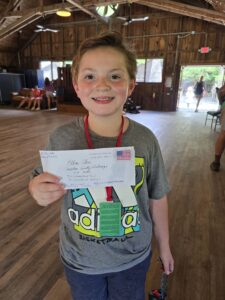
Parents, friends and loved ones may send letters during the week of camp to Wahsega’s address under the camper’s name and county like this:
Camper’s name
Camper’s county
Wahsega 4-H Center
77 Cloverleaf Trail
Dahlonega, GA 30533
Multiple pieces of mail
If you send multiple letters, please number them or label them with the day of the week that you would like for us to give them to your child.
Send mail early
Please put letters in the mail the week before camp starts.
What to send
Send letters, cards, toys or little gifts and, of course, lots of love. However, please do not send food. Food and candy are not allowed in the cabins.
Sending email messages
You can send email messages to your child at camp using the online messaging system through the Georgia 4-H website. Search “Georgia 4-h camper email”. First you will need the password provided by your county extension office. We distribute email messages to campers once a day.
Sending mail home from camp
Campers may send mail home while they are at camp. However, stamps and stationery are not available at Wahsega for purchase and email is not an option. Campers can give a stamped letter to an adult leader to mail, although it probably won’t get to you before the camper gets home.
Information About Chaperones & 4-H Center Staff
Chaperones & supervision of campers
Children are well supervised: In the cabins, in classes, at mealtime, during recreation times and all the times in between. Supervision is always provided by University of Georgia Extension 4-H staff and volunteers serving as chaperones. Chaperones staying overnight have been screened by a formal back- ground investigation, trained by UGA Extension staff and have fulfilled requirements to be Certified Georgia 4-H Overnight Chaperones.
Matching schedules for a camper and parent chaperone
Parents attending camp as chaperones do not have to be in the same groups as their child. However, if they want to be in the same group make this known to your county’s 4-H adult leader.
CAMPER CARE-GIVER – If a parent or other chaperone needs to be with a child all day every day for any reason, please notify us ahead of time and we’ll make sure that the child and adult have exactly matching assignments and schedules. When a care-giver is required, this person will not be charged for coming to camp.
4-H summer camp counselors
Counselors are screened by a formal background investigation, trained by 4-H staff at the 4-H center and certified to work with youth by the Georgia 4-H Program. They have all completed First Aid and CPR training and lifeguard training. In addition, they have extensive training by certified instructors in the use of the safety equipment used for the high-ropes elements. They are wonderful young people who serve as exemplary role models for the campers.
Other 4-H center staff members
Campers typically will get to know other members of the 4-H center staff. Dining hall staff will instruct campers in how to complete their duties when serving on KP and will interact with campers in the dining hall. The Center Director and Program Coordinator will also be around during some programs. All full-time and part-time staff members at the 4-H center have passed a background investigation and most have worked at the center for many years and truly enjoy being able to interact some with the Wahsega campers.
Emergency Information
Contact information
In the case of a family emergency, please call your local Extension office during office hours. The Extension office staff can help you determine who to talk to at camp and what to do next. After office hours, call our main office number and listen to the greeting for further information at 706-864-2050.
Medication at camp
PRESCRIPTION MEDS – If your child is taking prescription medication during camp, complete a Medication Summary form for the county 4-H office, which describes the medication, storage procedures, time and amount of dose. It’s very important that we know if your child takes prescription medication for allergies, ADD, ADHD, asthma or anything else. These medications affect behavior and we want to make sure they get their medication on time daily.
OTC MEDS – The 4-H office has to have approval to give your child over-the-counter medication as well as prescription medication, so OTC medication needs to be on the Medication Summary as well.
Insurance information
Complete the Medical Information and Release Form and a 4-H Code of Conduct Form. In case of an emergency, your child will be taken to an appropriate doctor or hospital. A person from your county will talk to you before taking your child to a doctor. In an emergency, you will be notified if your child is taken to the hospital.
If parents need to call Wahsega,
Expect to:
- Have messages delivered on the same day.
- Leave a voice mail when calling after business hours.
- Call the county Extension office to find out if the county has arrived safely at camp.
- Call the county Extension office first to check on a child or talk to a child during the week.
- Keep a child’s cell phone at home.
The 4-H center location
Wahsega 4-H Center is 12 miles north of Dahlonega on Forest Rd. 28-1 one mile from the end of Camp Wahsega Rd. and the entrance to Camp Frank D. Merrill, the Army Ranger Training School. The 4-H center is in a valley shared by Ward Creek on property owned by UGA in the Chattahoochee National Forest in the North Georgia Mountains.
Visiting the center & driving directions
If you would like to visit the Wahsega 4-H Center, please call us ahead of time to make arrangements as we are not normally open to the public. To get directions to Wahsega visit wahsega4h.org home page or call us. Please note that a GPS device, smart phone map app or online map are not good sources of directions and may direct you down very rough gravel forest service roads. You will need to notify the Extension Office in your county before the week of camp if you plan to visit or pick up your child at camp during the week or on Friday morning. We do not recommend parents visiting children during the middle of the week of camp.
Booking Information
We book county 4-H clubs rather than individual children for Cloverleaf Camp. You may still be able to get your child registered for 4-H camp through your local county 4-H club.
To get more information, call your county’s Cooperative Extension office and ask for the person responsible for 4-H camp. You can find contact information for each county online at: http://extension.uga.edu/about/county/index.cfm




